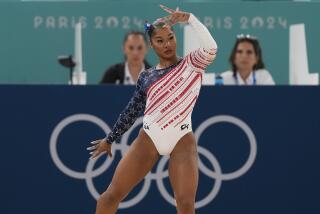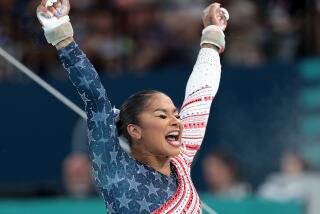Protest Targets Judging on Bars
- Share via
ATHENS — U.S. gymnast Paul Hamm will keep his gold medal in the men’s all-around, but, after a protest by South Korean officials, the International Gymnastics Federation is reviewing the score received by Yang Tae Young in the parallel bars during Wednesday’s competition.
Hamm, the first U.S. man to win Olympic gold in the event, had a final score of 57.823 -- 0.012 of a point better than silver medalist Kim Dae Eun and 0.049 better than Yang in the closest all-around finish in Olympic history.
According to Philippe Silacci, spokesman for the international federation, the protest stems from judges placing the start value of Yang’s routine at 9.9 after it had been listed as 10.0 during qualifying and team competition. The start value is the score from which a routine is judged. If the start value were 9.9, a perfect performance would receive a 9.9.
Had Yang’s performance been judged from a 10.0 start, the Korean coaches suggested, his score would have been 0.10 higher, good enough for the gold medal.
However, federation rules state that protests must be made before the start of the next rotation in the competition, which didn’t happen.
Therefore, even if the review reveals a judging mistake was made, there could be no reversal of the final medal placements, Silacci said.
“The rules do not allow for a protest against the judges’ marks,” he said in a statement released late Friday night. “The judges’ marks have to be accepted as a final decision and cannot be changed.”
Peter Vidmar, a member of the 1984 U.S. men’s team and an all-around silver medalist in those Los Angeles Games, said he could not recall anyone filing a protest two days after a competition.
“You file the second you get your scores,” Vidmar said. “You don’t petition judges for a higher score two days later. It would sadden me, really sadden me, if this took away from what Paul accomplished.”
Silacci said that what is taking place is a routine analysis of the judges’ performance. “Judges make mistakes, and that’s human,” Silacci said. “Normally, we would conduct this review much later, in the weeks or months after competition. But we held this meeting quickly so that, if needed, we can sanction the judges before Monday’s parallel bars event final.”
After Wednesday’s competition, Yang said through an interpreter that he didn’t deserve the gold because of a mistake on the parallel bars.
Two days before the Olympic competition began, the U.S. team had been surprised when the high bar routines of three of its competitors -- Blaine Wilson, Jason Gatson and Brett McClure -- were given start values of 9.8 instead of the 10.0s of the last two years.
Wilson changed his routine in the 48 hours before team qualifying began and took a dramatic fall onto his back while performing a new move he had inserted to regain the 10.0 value.
USA Gymnastics officials refused comment on the South Korean protest, saying that it did not involve them.
Silacci said he hoped for the review to be completed today. “The best judges are rewarded,” he said. “Those who did not judge correctly and made serious mistakes are severely sanctioned. This process will be followed for the Olympic Games.”
More to Read
Go beyond the scoreboard
Get the latest on L.A.'s teams in the daily Sports Report newsletter.
You may occasionally receive promotional content from the Los Angeles Times.






